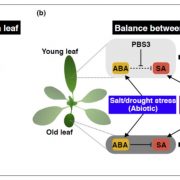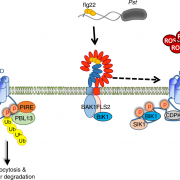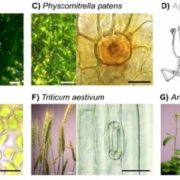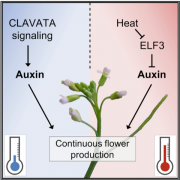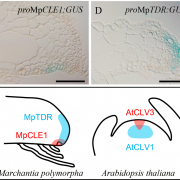The maize heterotrimeric G protein β subunit controls shoot meristem development and immune responses ($) (PNAS)
 Heterotrimeric G proteins transduce signals between receptors and downstream factors. Previous genetic studies have shown diverse roles for these proteins based on loss-of-function phenotypes; for example mutations in Arabidopsis Gα and Gβ subunits both lead to enlarged shoot apical meristems. Wu et al. used CRISPR/Cas9 to knock out the maize gene encoding Gβ and found a seedling-lethal phenotype (similar to findings in rice). Interestingly, this isn’t a developmental defect, but is instead due to a hyperimmune response. When the knockout was introgressed into a line that suppresses this immunity, the plants survived and showed developmental defects in the shoot apical meristem leading to fasciation (formation of a flattened, strap-like meristem). The authors also identified another fasciated mutant, fea*183, with a single-amino acid change in the Gβ-encoding gene. The authors conclude, “Our study shows that ZmGB1 is a critical regulator in both meristem development and immunity; therefore, this gene has the potential to optimize defense–development trade-offs to improve agronomic production.” (Summary by Mary Williams) Proc. Natl. Acad. Sci. USA 10.1073/pnas.1917577116
Heterotrimeric G proteins transduce signals between receptors and downstream factors. Previous genetic studies have shown diverse roles for these proteins based on loss-of-function phenotypes; for example mutations in Arabidopsis Gα and Gβ subunits both lead to enlarged shoot apical meristems. Wu et al. used CRISPR/Cas9 to knock out the maize gene encoding Gβ and found a seedling-lethal phenotype (similar to findings in rice). Interestingly, this isn’t a developmental defect, but is instead due to a hyperimmune response. When the knockout was introgressed into a line that suppresses this immunity, the plants survived and showed developmental defects in the shoot apical meristem leading to fasciation (formation of a flattened, strap-like meristem). The authors also identified another fasciated mutant, fea*183, with a single-amino acid change in the Gβ-encoding gene. The authors conclude, “Our study shows that ZmGB1 is a critical regulator in both meristem development and immunity; therefore, this gene has the potential to optimize defense–development trade-offs to improve agronomic production.” (Summary by Mary Williams) Proc. Natl. Acad. Sci. USA 10.1073/pnas.1917577116



